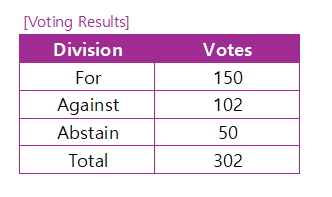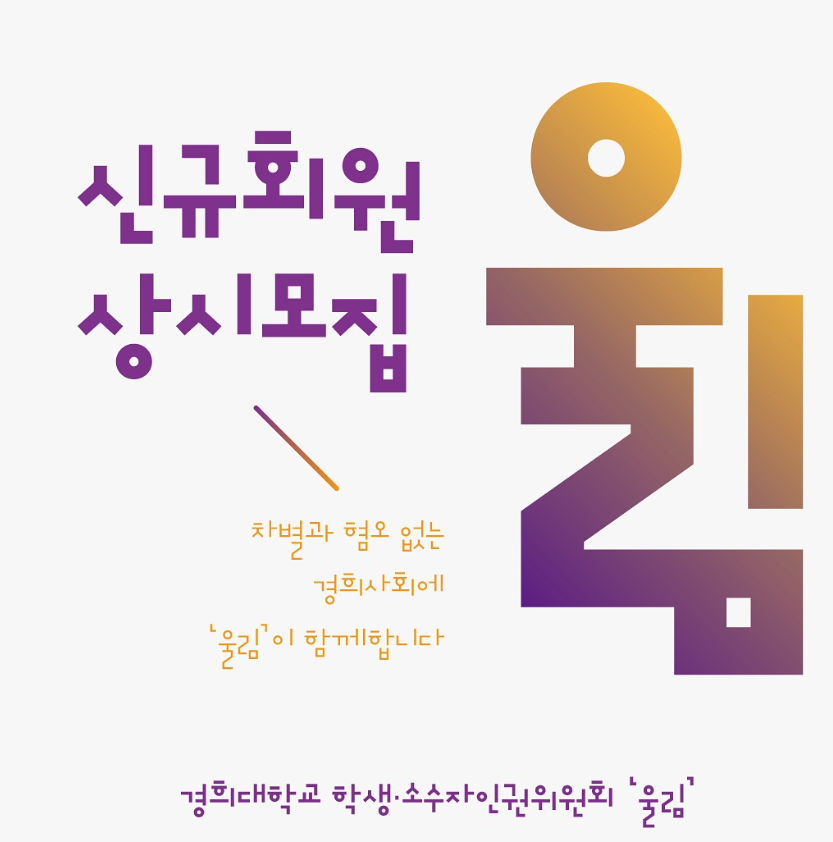[Campus] Ullim to Continue After Existential Crisis
Related Stories
● The Future of KHU’s Student Minority Rights Committee in Question
The controversy over the existence of Kyung Hee University's Student Minority Human Rights Committee, Ullim, came to an end. On August 11, the General Student Representative Council (GSRC) confirmed Ullim’s continued existence. The decision came three months after the initial dispute between Ullim and the College of Politics & Economics Student Association, The Naeun, over a lecture by former presidential candidate Lee Jun-seok.
A Timeline of Ullim's Existential Crisis, from the June Hearing to the GSRC
Following the first public hearing, discussions on Ullim’s existence unfolded across a series of Expanded Operations Committee (EOC) and Central Operations Committee (COC) meetings. The process began on June 25, when the 5th regular EOC meeting debated whether to hold a second public hearing and to convene the GSRC. With majority approval from both the EOC and the COC, the joint proposal to convene the GSRC was formally recognized. Ullim, however, requested that another hearing be scheduled before fixing the GSRC date.
Five days later, at the 9th COC meeting, the conditions were met to propose a provisional GSRC with the agenda item of abolishing Ullim. The matter of how to proceed with the process was also placed on the agenda. Ullim contended that the first hearing, held during exam season, had not adequately reflected diverse student voices. They suggested either a second hearing or two GSRC—one for discussion and another for decision-making. After a lengthy debate, the matter was carried over to the next meeting.
During the 10th COC meeting on July 14, the proposal for a second hearing was voted down, and members reached consensus that the provisional GSRC would be held only once. At the 11th COC meeting, the date of the provisional GSRC was confirmed for August 11. In accordance with the bylaws, 69 student representatives were ultimately selected by the lottery.
The 12th COC meeting confirmed the list of representatives. Members were also reminded that abolishing Ullim would require the approval of two-thirds of those present at the GSRC. Finally, on August 11, the GSRC convened online with roughly 300 participants, including student representatives. In the final vote, the proposal to abolish Ullim failed to secure the necessary two-thirds support, allowing the committee to continue its work.

The voting outcome for the abolition of Ullim
Student Reactions to Ullim's Continued Existence
Reactions among students to the decision to maintain Ullim were mixed. A student who participated as a representative in the GSRC expressed support, expressing doubts about the fairness of the initial discussion. He said, “I question whether the discussion served its purpose as a public forum. Ullim wanted to have a constructive dialogue with The Naeun, but couldn't.” He commented that the EOC's discussion felt strongly like a hearing just for Ullim. And he argued, “It is not logically correct to try and abolish Ullim just because they engaged in activities you don't agree with.”
On the other hand, there were critical voices about Ullim's continued existence. A student who attended the public hearing raised concerns that recurring issues with student groups misusing funds could also happen within Ullim. He also questioned Ullim's involvement in outside affairs, saying, “Getting deeply involved in external political issues seems risky because it can deviate from the students' fundamental activities and be twisted into a tool for specific political purposes.”
Additionally, he raised doubts about the committee's representative capacity, adding, “I wonder whether the student committee can truly represent all students. If they do not have the majority of students' consent and support, I think they could become a group that only raises political voices, hiding behind the cause of serving minorities.”

Ullim, a student minority human rights committee
Photo: khu_haksowee (instagram.com)
After Facing an Existential Crisis, What's Next for Ullim?
In response to the mixed reactions, Ullim regarded the discussion as an opportunity for internal reflection. Ullim's Vice Chair, Ha Hyun-hee said, “Through the public hearing, we learned that there are students who support the existence of Ullim, and we realized that its existence is necessary.”
Ha acknowledged that the debate over its survival was not easy, calling it “unprecedented in the student community for an organization to face an existential crisis.” She added that submitting explanatory materials and participating in various meetings where “the discussion felt like it was going in circles,” was difficult. She also voiced concern that “activities giving voice to the marginalized and oppressed could themselves be suppressed and disappear without discussion.”
Ullim plans to change the direction of its future activities. “We felt that students’ trust is essential, so we will focus on strengthening internal communication and promoting activities students can actively participate in,” she explained. She also shared her plan to “increase the number of activities we host ourselves so that we can attract other solidarity, rather than just participating in external alliances.” Specifically, they plan to form a human rights violation monitoring team during the fall festival and hold an on-campus human rights festival to strengthen communication with various constituents. She emphasized that they will also continue to pursue existing agendas, such as guaranteeing securing employment quotas for persons with disabilities and establishing gender-queer education as a required liberal arts course.
Regarding Ullim's future plan, a student who participated in the GSRC expressed his hope that the incident would serve as an opportunity for Ullim to improve. He said, “I hope they improve existing issues, such as the budget problems that have been continuously raised, and focus on activities that a majority of students can support.”
A student who attended the public hearing said, “Transparent financial disclosure and a focus on on-campus issues are important.” He added, “To be a truly effective organization, they will prioritize communication and consensus-building with the entire student body.”
The incident sparked an important discussion about the roles of student self-governance and minority human rights organizations. With its continued existence confirmed, the focus now shifts to how Ullim will work to earn back the trust of the student community.
There are no registered comments.
I agree to the collection of personal information. [view]

